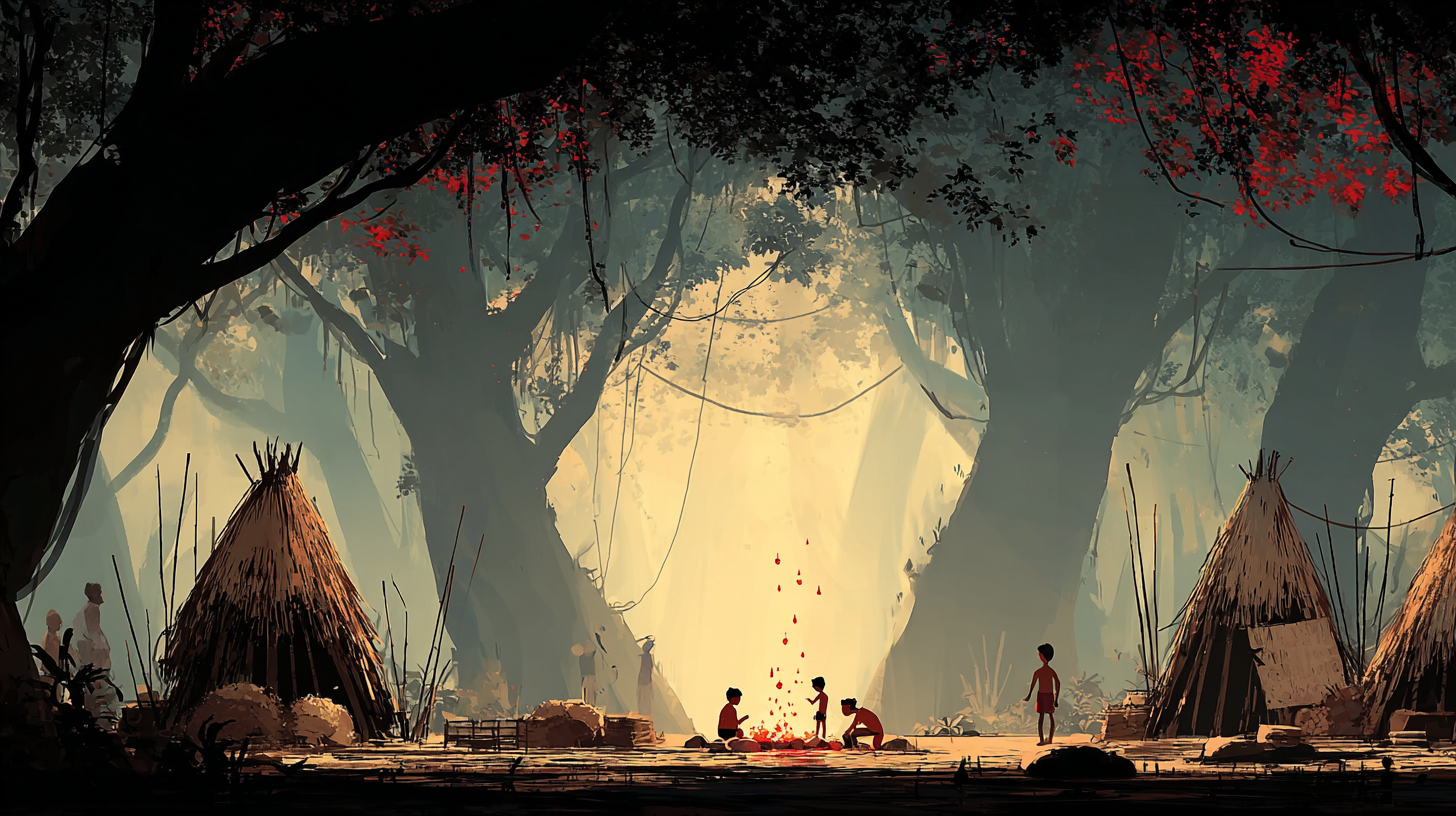“Primitive” means something from a long time ago when people didn’t have modern tools or machines.
primitiveは「とても昔の時代の、まだ技術などが発達していない様子」を表す言葉です。
以下は英単語 “primitive” に関するストーリー型学習コンテンツです。まずは大枠の意味を理解して最後の文章で確認しましょう。
primitiveの主な意味(main meaning)
| 品詞 | 意味 | 発音記号(IPA) | 英語例文 |
|---|---|---|---|
| 形容詞 | 原始的な、古代の、未発達な | /ˈprɪm.ə.tɪv/ | Primitive tools were made from stone and wood. |
| 名詞 | 原始人、初期のもの | /ˈprɪm.ə.tɪv/ | The museum has a painting by a primitive. |
primitiveの語源(etymology)
“Primitive” はラテン語の primitivus(最初の、原始の)から来ています。”primus”(最初の)という語がもとで、「最初の時代のもの」というイメージがあります。
primitiveの類義語(synonyms)
| 類義語 | 例文 |
|---|---|
| ancient | Ancient ruins were found deep in the jungle. |
| basic | This shelter is very basic but it protects us from the rain. |
| undeveloped | The country has many undeveloped areas with no electricity. |
| early | Early humans used fire for cooking and protection. |
| prehistoric | Prehistoric animals are displayed in the museum. |
primitiveの反義語(antonyms)
| 反義語 | 例文 |
|---|---|
| modern | We live in a modern society with advanced technology. |
| advanced | This smartphone has many advanced features. |
primitiveのコロケーション(collocations)
| コロケーション | 例文 |
|---|---|
| primitive tools | Primitive tools were used for hunting and building. |
| primitive society | They studied the culture of a primitive society. |
| primitive technology | The movie showed primitive technology used in the past. |
| primitive lifestyle | He lived a primitive lifestyle in the mountains. |
| primitive art | The museum displays primitive art from ancient tribes. |
primitiveの2項表現(binomials)
| 表現 | 例文 |
|---|---|
| rough and primitive | The cabin was rough and primitive, with no electricity. |
| ancient and primitive | Ancient and primitive weapons were found in the cave. |
英語ストーリー(english story)
Title: “The Research Trip”
Emily was a young archaeologist. One day, she traveled to a remote area in South America to study a primitive society. The people lived in the jungle, used primitive tools, and followed a primitive lifestyle. They had no electricity or running water. Their technology was very basic, and they still cooked with fire, just like early humans.
Emily found the experience exciting. She was amazed at how the people lived so happily with such undeveloped resources. One night, while sitting by the fire, the village elder told her stories about their past and showed her ancient and primitive weapons. These weapons were made of stone and wood, just like in the prehistoric times.
She also visited a museum nearby that displayed primitive art. The rough and primitive paintings were beautiful in their own way. Emily realized how important it was to understand history and how far humans had come.
When she returned to her modern life, she appreciated her advanced tools and machines more. But she also remembered the primitive life with respect and admiration.
和訳
タイトル:「調査旅行」
エミリーは若い考古学者でした。ある日、彼女は南アメリカの遠く離れた地域にある*primitive society(原始的な社会)*を研究するために旅に出ました。そこに住む人々はジャングルで暮らし、*primitive tools(原始的な道具)*を使い、*primitive lifestyle(原始的な生活)を送っていました。電気も水道もありません。彼らのtechnology(技術)はとてもbasic(基本的)*で、*early(初期の)*人類のように火で料理していました。
エミリーはこの体験をとてもわくわくしながら受け止めました。資源がとても*undeveloped(未開発)*なのに、人々が幸せに暮らしていることに驚きました。ある夜、焚き火のそばで村の長老が昔の話をしてくれ、*ancient and primitive(古代で原始的な)武器を見せてくれました。それらの武器はprehistoric(先史時代の)*と同じく石と木でできていました。
彼女は近くの博物館も訪れ、*primitive art(原始的な芸術)を鑑賞しました。そのrough and primitive(粗くて原始的な)*絵画は独自の美しさを持っていました。エミリーは、人類の歴史を知ることがいかに大切かを感じました。
現代の生活に戻ってからは、自分の*modern(現代的な)な生活やadvanced(進んだ)*道具をより感謝するようになりました。しかし同時に、*primitive(原始的な)*な生活を敬意とともに思い出しました。
primitiveのQ&A
- Q“primitive” と “ancient” の違いは何ですか?
- A
“ancient” は「とても昔の時代」のことを指しますが、”primitive” は「技術や文明がまだ発達していない状態」を強調します。例えば、古代ローマは “ancient” ですが、生活や建築は “primitive” ではありません。
- Q“primitive” と “basic” の違いは何ですか?
- A
“basic” は「基本的な、シンプルな」という意味で、現代の物や状況にも使えます。”primitive” はもっと昔の時代や未発達な状態に使います。例:”basic tools” は現代の最低限の道具、”primitive tools” は石などの原始的な道具です。
- Q“undeveloped” は “primitive” と同じ意味ですか?
- A
似ていますが少し違います。”undeveloped” は「まだ発展していない」という未来への可能性を含みます。”primitive” は「すでに存在していた原始的な状態」を指します。
- Q“modern” は “primitive” の反対語としてどう使いますか?
- A
“modern” は「現代的な、発達した」という意味で、”primitive”(原始的な)の正反対です。例:primitive society(原始社会)と modern society(現代社会)。
- Q“advanced” は “primitive” の反意語になりますか?
- A
はい、”advanced”(進んだ)は “primitive”(未発達な)の反対語になります。特に技術や知識に関して使われます。
- Q“primitive tools” はどんな道具のことですか?
- A
“primitive tools” は石や木など自然の素材で作られた、昔のシンプルな道具です。ナイフ、槍、火打ち石などが含まれます。
- Q“primitive society” という表現はいつ使いますか?
- A
昔の文明が発達していない社会や、現在でも近代的な技術がない集団について話すときに使います。
- Q“primitive lifestyle” と “modern lifestyle” の違いは何ですか?
- A
“primitive lifestyle” は電気や水道のない、昔ながらの自然と共に暮らす生活です。”modern lifestyle” は便利な技術を使った現代的な生活を指します。
- Q“rough and primitive” はどんな場面で使いますか?
- A
環境や建物が非常に簡素で不便な場合に使います。例:山小屋が rough and primitive(粗末で原始的)だった。
- Q“ancient and primitive” はどのように意味が違うのですか?
- A
“ancient” は時間的に昔であることを、”primitive” は技術的・文化的に未発達であることを表します。2つの語は合わせて使われることが多いです。



コメント